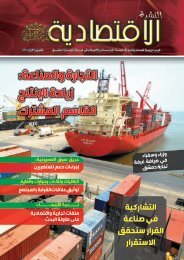SIGAR
2017-01-30qr
2017-01-30qr
Create successful ePaper yourself
Turn your PDF publications into a flip-book with our unique Google optimized e-Paper software.
AFGHAN PROCUREMENT REFORM<br />
system fraught with corruption for decades, and still keep a functioning<br />
procurement system during a time of war.” 30 CSTC-A aims to transition the<br />
use of congressionally appropriated Afghan Security Forces Fund money to<br />
the Afghan government over the course of several years for “cradle-to-grave<br />
execution and management” of requirements procurement. 31<br />
In response to the additional responsibility the NPA will shoulder as the<br />
Afghan government handles more procurement funds itself, <strong>SIGAR</strong> has<br />
prepared fraud-awareness briefings to help NPA specialists recognize fraud<br />
indicators and select appropriate responses. <strong>SIGAR</strong> staff have also met with<br />
NPA personnel to discuss new Afghan regulations on debarment under the<br />
country’s public-procurement law, the need for reviewing the responsibility<br />
of owners and affiliates of contractors accused of fraud and poor performance,<br />
the use of online databases to provide publicly available information<br />
about debarment decisions, and to review the way <strong>SIGAR</strong>’s suspension and<br />
debarment program operates.<br />
Imposing a reform-oriented entity in a problematic environment has<br />
been a challenge. “From the very beginning,” says Murtaza Noori, former<br />
NPA director of procurement policy, “the reform process faced protests<br />
from government officials and members of parliament. Criminal patronage<br />
networks extended into the government itself, and were trying to manipulate<br />
and sabotage procurement reforms.” 32<br />
Using suspension and debarment procedures is one way Afghanistan can<br />
clamp down on the networks of corruption and patronage that plague its<br />
procurement operations. In the United States, suspension and debarment<br />
are long-established administrative tools to ensure that the U.S. government<br />
contracts or otherwise transacts business only with responsible persons,<br />
as statute mandates. 33 Suspension is an immediate but temporary bar on<br />
doing business with the government; debarment is not immediate, but after<br />
a noticed proceeding, can be long-term. 34<br />
By cooperating with Afghan procurement authorities, <strong>SIGAR</strong> aims to foster<br />
sharper oversight and more effective accountability for vendors doing business<br />
with the Afghan government—and to a large extent being paid with U.S.<br />
taxpayers’ dollars. As of December 30, 2016, the NPA reports that 137 Afghan<br />
companies have been debarred from doing business with the Kabul government.<br />
Reasons for the debarments include providing phony bank statements,<br />
false documents about other contracts, and fake bid-security documents. 35<br />
One reflection of the influence <strong>SIGAR</strong> and CSTC-A have had on the<br />
course of procurement reform in Afghanistan is that <strong>SIGAR</strong> Investigations<br />
Directorate staff and CSTC-A representatives are invited observers—<br />
and typically the only non-Afghans attending—at the weekly sessions of<br />
President Ghani’s National Procurement Commission. <strong>SIGAR</strong> has found this<br />
access to be valuable as a means of gaining insight into Afghan government<br />
operations and to offer recommendations on matters that come before<br />
the NPC.<br />
REPORT TO THE UNITED STATES CONGRESS I JANUARY 30, 2017<br />
11







